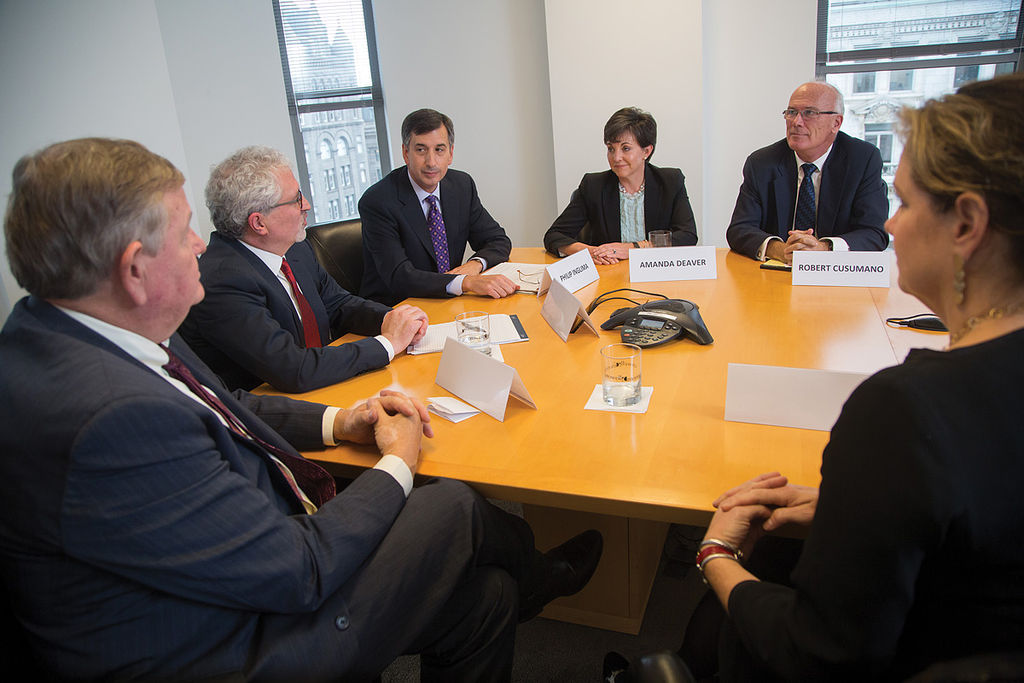Roundtable: When Crisis Strikes
Publication | 01.19.16
Ready or not, crises—large or small—can hit a company at any time. A panel of public relations professionals and Crowell & Moring attorneys discusses the unwritten rules of dealing with corporate crises.
ROUNDTABLE PARTICIPANTS
- Moderator: Scott Winkelman, Crowell & Moring Regulatory Department chair
- Robert Cusumano, Crowell & Moring Insurance/Reinsurance Group partner and former general counsel of ACE Ltd.
- Amanda Deaver, president of Upstream Strategic Communications
- Former Governor Dave Freudenthal (WY), Crowell & Moring Environment & Natural Resources Group senior counsel
- Philip Inglima, Crowell & Moring White Collar & Regulatory Enforcement partner
- Jennifer Loven, Glover Park Group managing director, former Associated Press chief White House correspondent
- Nancy Saracino, Crowell & Moring Energy Group partner and former vice president, general counsel, and chief administrative officer for the California Independent System Operator Corp. (CAISO)

Scott Winkelman: Let's kick this off with a call I received from a client who wanted to engage us on a class action of some magnitude dollar-wise and reputationally. While many would see this as garden-variety litigation, what the general counsel said was, "This may not seem like a crisis to you, but it's the only one I've got." I've always remembered those words because it's the orientation an in-house lawyer or crisis expert often has to have. How do you decide when you have a crisis and when to activate the machinery?
Amanda Deaver: You have to engage clients where they are and be responsive, and if it's not a crisis, you can help them step back. But sometimes the opposite happens. I've had clients come with a situation where they are a little myopic and we're saying, "This is bigger than what we're talking about."
Dave Freudenthal: Any issue can become a crisis if you mismanage it. People should take what may seem like routine things and think them through before they turn into problems. Companies need to think about what can go wrong. If they don't, they're not going to be far enough down the road, and then it's too late. People need to have created some response mechanism. You can't build the machinery at the same time you're trying to activate it.
Bob Cusumano: I think it's a spectrum. It isn't always an instant trigger point. In many companies, everything's a crisis, so if a true crisis emerges, there needs to be a ready-built apparatus with tools customized for the job. Corporations are sometimes myopic and not sensitive to the feelings of others. Sometimes they need to get knocked around a bit by someone who's saying you are living in a non-rational world where audiences have emotional reactions and want real people to react the right way. That is countercultural for corporations. It's a learning experience that has to happen on the fly.
Nancy Saracino: Any company could be tossed into crises at any moment. Larger organizations need to be prepared, and part of that includes an effective pre-response assessment process, meaning you have a crisis assessment group that can be assembled quickly, evaluate the circumstances, have a conversation about the right response, and report out to the decision makers. Some people may have a tin ear to certain things, and that's where tabletop exercises are really important. You can design them to trigger exactly the kind of reaction you're trying to avoid in a real-time crisis. You can simulate something like an incidence of violence in the workplace where you have to evacuate the building, to see how your executives react. Do they think of the families? How are they going to be coming across to the press and to the people who are huddling in the parking lot?
Cusumano: It's empathy training in the end, and it's hard to get them to sit for that, but it can be very useful.
WHO SHOULD BE IN THE ROOM?
Jennifer Loven: One of the mistakes often made is not including people like communicators or lawyers at the front end. We get called a lot at the back end when something starts to go wrong. If you have experienced people whose jobs are to think three, four, five, six steps down the line, in a way that people who have day jobs just can't or don't, we can play that out and say, "This is where this is going to go if you go with this decision." It may be a business function where the leadership feels like the communicator shouldn't be in the room. They should be in the room. The lawyers should be in the room—to help manage risk, predict risk, and help plan for risk.
Phil Inglima: Most companies have crisis plans and believe that if they have a general counsel or her or his designee ready to implement that plan with the right internal cadre of participants, that's all they need. But two factors should be considered: first, are they really in the best position to make sure they've got all the right people in the room? Sometimes proximity can blind you, and having somebody from outside look at it can help. The second thing is, they have to consider how others will view it later, much later. Because very few crises for a regulated company are not going to be scrutinized by at least their primary regulatory agency, if not the Department of Justice. And the DOJ increasingly looks at whether the executives are protecting themselves and each other rather than the true stakeholders. It's going to play out slowly.
Freudenthal: I would argue that there is the assumption that you have time to think about this, but most of the time you don't have time to sit around and say, "You know, I think I ought to call the lawyer." You can't anticipate exactly how the crisis is going to unfold. The key is to have a relationship at the outset so you begin to think about the crisis with both the lawyers and the PR people, recognizing that at some point you're probably going to have to make a decision that is not as thoughtful as you might have preferred it to be. And then you better have a crew around who can clean up the mess afterwards and guide you through it.
DECISIONS: "IT'S NOT ABOUT YOU"
Deaver: The decision-making authority has to be clear before someone is asked to make a decision. If you're figuring it out while you're contemplating the dimensions of the decision, you're toast. It's not necessarily by title. Sometimes the 22-year-old who answers the phone in customer service has better instincts because she is hearing unvarnished information. Or the kid managing the Twitter account. You don't bring them all into the discussion, but you don't just bring the management team and insulate yourselves from everyone else. You can over- analyze, but you just have to strike the right balance. I've seen so many companies miss deadlines because they couldn't make a decision that was right in front of them. They had all the information they needed. At some point you have to say, "I have enough information; I've got to get going."
Loven: The group can't be a giant committee. You need to know who is going to be responsible for signing off. If you know where you want your organization to go, that becomes your guidepost to decide what is the right thing to say. Do you say a little bit more than the lawyers tell you that you should, or a little bit less than the communicators think you should? Or do you use a tone of humility when everybody tells you that that's going to get you into trouble? Or do you stay super argumentative and defensive even though your PR people might tell you that that's going to come off wrong?
Saracino: When you do respond, you need to remember it's not about you. It's not about your company. It's about whatever the incident was and the people who are out there.
Cusumano: I had a little motto when I was a general counsel: "It's about the thing itself." And that is such a hard message to get through because everybody wants to do a good job. They don't want to look bad.
Deaver: And somebody needs to be in the group who is an outsider who can say, "This is not a witch hunt, there'll be a time and a place to put the pieces back together."
SHOULD MANAGEMENT BE INSULATED?
Winkelman: Let's talk about senior management in the heat of a crisis. The head of the company may deeply wish for and feel a need to be engaged as a responsible person. The lawyer may well say that poses significant risks and it's better to insulate that person. How do we strike the balance?
Inglima: Well, the balance will start with the dimension of the problem. When it is one that's been of great human loss or great impact to a community, you have to have somebody at a high level making statements that express the company's empathy and feeling of responsibility. But there's a big difference between making isolated statements that go to the sense of remorse versus starting to explain what happened and why. At an early point in a crisis, to have some officer making all the public statements can be enormously dangerous and create an expectation that you can't back away from without seeming to isolate that person in the bull's eye.
Saracino: There's a great model used by public agencies and agencies responsible for emergency response that's called the incident command structure. This is one instance where preplanning really is important if you're in a position to have data that might get leaked, confidential information inadvertently released, or a hack, where you may need to be on a call with regulators or legislators and on message. And you may also need to have social media managed and somebody out in front of the cameras. You need to make sure the designated spokesperson understands that you're going to be calling on him or her, and it's also important to have several people lined up and trained in case the designated person is unavailable.
Freudenthal: I would second distinguishing between who is in charge and who is out front. I would make sure, for example, that you don't hire a plant manager who can't handle an interview, because a death at a plant or mine is probably better discussed by the manager or the plant superintendent because they're part of the community and more likely to convey something that is empathetic, and smart enough to say what they don't know. If you elevate that above the plant manager and all of a sudden here comes somebody flying in from Houston, and they jump off the plane and make some big announcement, you have elevated the crisis in everybody's perception.
Cusumano: You need sincerity, you need integrity, and you need authority. And that can be different people depending on different parts of the situation. We had a phrase about being involved: are they "in the facts"? People who are in the facts are not going to be that credible. At the same time, you have to have some authority, because if you're just a talker, then you're not going to get your message through because people are not going to want to hear it.
Winkelman: Can the spokesperson role be outsourced effectively?
Deaver: It can, but usually it shouldn't be. There are lots of things a consultant can do behind the scenes. They can brief reporters. They can get the spokesperson well positioned to be successful. But ultimately you need someone from within the organization. I've been in the situation where I'm introduced as the crisis PR person. Woo, woo, woo, the reverberations that go through the company—we've hired someone, it must be really bad. That's not helpful.
Loven: There needs to be care that's communicated in terms of how professionals are brought on to help, because if they're brought in to be the person who goes on TV and communicates about this very serious event, that connotes there isn't anyone there who is capable. Sometimes that's not true when it comes to lawyers. Counsel can be very effective as spokespeople for a lot of reasons, such as having knowledge and authority and a presence that gives the implicit message that we're taking this seriously.
Freudenthal: In all of this, people often forget simple things like the earnings call. It's not just messaging; it's a messaging discipline that has some rigor and sequencing that lawyers need to look at, but they also need to think about the many faces the company has. People get in trouble on earnings calls because you've got somebody who may not know the particular set of facts and may not have the good sense to say, "I don't know."
EMPLOYEES: "WE HAVE YOUR BACK"
Inglima: In Enron, theories of prosecution were centered specifically on earnings calls, so that's a very real example of the hazards that people overlook. Who cannot hear this first from the media? Who cannot hear it first when the government says something about it? Your employees have to be hearing what you're telling external stakeholders in real time or perhaps just in advance of what you're going to say externally. Many of them are likely witnesses, and you don't want them to feel like there are different versions of reality being percolated for different audiences.
Cusumano: Often you want a separate and somewhat different message for employees because you want that message to be more familial and more supportive even as you're saying, "Look, we have a problem. We have to cooperate with regulators and all of you have to stand up and do the right thing here, but understand we have your back."
Deaver: I think that if you had a good relationship with your employees before the crisis, then you want to preserve that. If you didn't, you can't build it in the crisis. But if you did, it was probably predicated on a level of trust and disclosure and respect and there was a good flow of information, and you've got to manage that so carefully. Employees need to know that somebody is on top of it. In my experience, the times when employees become a problem, it's often because no one has reassured them and then they start chatting on blogs. They ask questions because they aren't being given answers, and then you have a brush fire that you didn't expect.
Saracino: Your company needs a policy about providing legal counsel for individual employees in the event of an internal investigation where there may be disciplinary consequences or an investigation from a regulatory entity where fines or penalties are at stake. You need a process that protects both the company and the employees that the employees can trust. Getting information from those involved is critical, and keeping their confidence that the process is being run in a fair manner is key.
THE IMPACT OF SOCIAL MEDIA
Winkelman: Let's take that to the world of social media where everybody's a journalist, where the proverbial 24/7 news cycle truly is. Has that changed the craft of crisis management?
Deaver: One of the things we do is help clients distinguish between social media platforms and social media personas that have credibility, that have a wide platform, that have the potential to be helpful or harmful. People can get worked up about social media as if all content is equal, and it's not. The flip side is that social media is so targeted, it gives us great opportunities as communicators to respond. You have to know to work the social media outlets, but people shouldn't be as afraid of it as I think some are.
Loven: Social media poses some challenges because of the way a piece of information can go viral and reach audiences that people couldn't reach before in quite the same way. But it's a tool. Very often the best use of Twitter in a crisis is as a canary in a coal mine for where the conversation is going. Then you can get ahead of it and participate if you are savvy about the tone and the tactics that you use. The other thing is the explosion of platforms to communicate on. You don't have to just go through The New York Times, you can go through thousands of entities, many of them owned and controlled by you. Today it only matters if you publish somewhere, because then you can republish yourself and target specific audiences that do matter.
Inglima: That gives rise to the point that you should remember who your friends are and reach out to them and engage with your natural allies, because you might find that a university or a nonprofit or think tank has a lot to say about the issue that is plaguing you.
Loven: Companies often fail to cultivate friends before they need them. If you've not laid the groundwork in terms of finding like-minded thinkers, cultivating relationships within the regulator and the policy-maker community and in the opinion-elite community, you can't get it done in the middle of a firestorm.
THE DYNAMIC CRISIS
Cusumano:
These situations are dynamic. Crises are not a moment in time, and they branch in different directions. The attention span of the media can be very long or very, very short. What you think you're going to be doing two weeks from now may not resemble what you end up doing because people have lost interest. You have to be unbelievably adaptive and understand that the right answer on day one is not the right answer on day 21.
Deaver: One of the places where you can really get in trouble is you have clearly established goals on day one and by the time you get to day 30, you've forgotten them, they've changed, they're no longer clear. It's really important that somebody regularly reconvenes and asks, 'Have our goals changed? Are we still meeting them? Do we really have them in mind?' You can go off course pretty fast. Goals should change along the way, and people need to recalibrate when they do.
Freudenthal: The rule ought to be, just stick with the truth, and if you're not sure what it is, say I don't know, because it doesn't involve complicated posturing. It doesn't mean that you don't choose your words carefully to make sure that what you're really conveying is the whole truth and nothing but the truth. You can get trapped in your own web if you lose sight of the fact that the truth is just easier. And, OK, the media may take you apart on it, but the average reader says that may be the only adult comment anybody ever made because you know the day after you don't usually know why it did happen.
Congressional Investigations
Phil Inglima: Some of the rules we've talked about apply with a congressional investigation. While Congress usually wants to target the highest official it can find, you almost never want to provide that individual. You want to limit that individual's accountability on the witness stand. You need to slow the pace until you have reliable information. Managing the flow of information to investigators is critically important.
Jennifer Loven: Trying to shape the story so there's some balance can be dangerous when it comes to trying to get ahead of a congressional investigation because then you've inflamed them by trying to go around them. Ultimately you're going to take your lumps with committees because they have the control, and you have to prepare for it. You need to understand the political and PR angles, because they don't hold a hearing unless they want attention for it.
Amanda Deaver: Understanding how you manage the audiences that were important the week before and will be important the week after needs to be part of your plan. Don't leave it to the politicians or the media to describe what happened. Everything you would do for a 20/20 interview, you have to do for a congressional hearing.
[PDF Download: 2016
|
|
[Web Index: 2016 Regulatory
|
Contacts
Insights
Publication | May 25-27, 2008
“ISI mitigation using bit-edge equalization in high-speed backplane data transmission,” in IEEE International Conference on Communications, Circuits and Systems (ICCCAS 2008), pp. 589 - 593.
Publication | 04.15.24
Publication | 04.10.24
Publication | 2023




